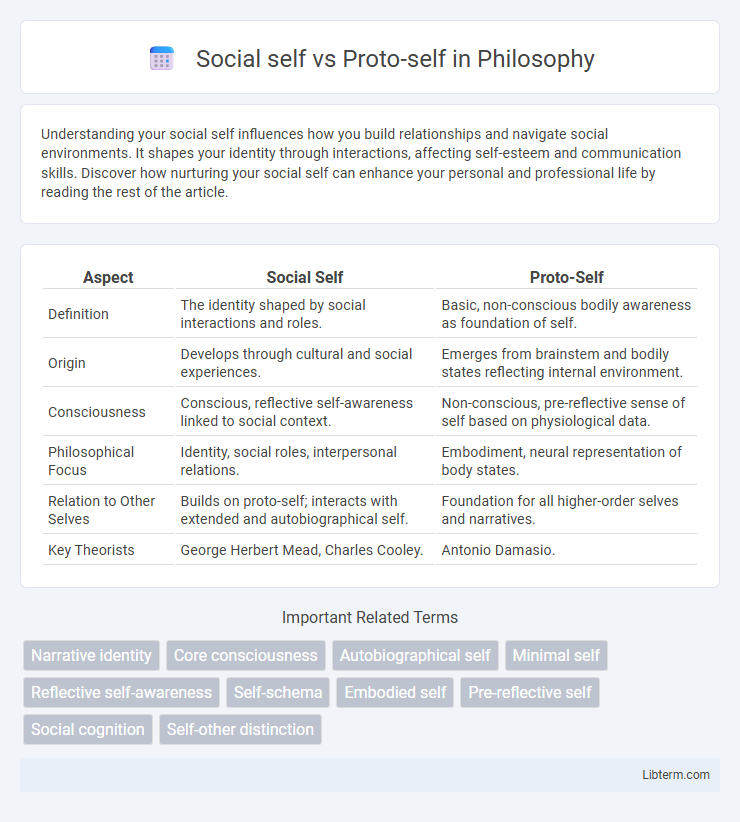Understanding your social self influences how you build relationships and navigate social environments. It shapes your identity through interactions, affecting self-esteem and communication skills. Discover how nurturing your social self can enhance your personal and professional life by reading the rest of the article.
Table of Comparison
| Aspect | Social Self | Proto-Self |
|---|---|---|
| Definition | The identity shaped by social interactions and roles. | Basic, non-conscious bodily awareness as foundation of self. |
| Origin | Develops through cultural and social experiences. | Emerges from brainstem and bodily states reflecting internal environment. |
| Consciousness | Conscious, reflective self-awareness linked to social context. | Non-conscious, pre-reflective sense of self based on physiological data. |
| Philosophical Focus | Identity, social roles, interpersonal relations. | Embodiment, neural representation of body states. |
| Relation to Other Selves | Builds on proto-self; interacts with extended and autobiographical self. | Foundation for all higher-order selves and narratives. |
| Key Theorists | George Herbert Mead, Charles Cooley. | Antonio Damasio. |
Understanding the Proto-Self: The Foundations of Self-Awareness
The proto-self forms the foundational layer of self-awareness, comprising non-conscious representations of the body's physiological state that enable the brain to map internal signals continuously. This pre-reflective self-model integrates interoceptive, proprioceptive, and autonomic data to create a coherent sense of being that precedes social or reflective self-awareness. Understanding the proto-self is crucial for exploring how subjective experience emerges from embodied neural processes before social interactions shape the social self.
Defining the Social Self: Identity Within a Community
The social self is defined by an individual's identity shaped through interactions and relationships within a community, emphasizing roles, norms, and shared values that influence behavior. In contrast, the proto-self represents the foundational, pre-conscious bodily experiences that form the basis of self-awareness but lack social context. Understanding the social self involves examining how personal identity is constructed and maintained through social engagement and collective belonging.
Neuroscientific Perspectives: Brain Mechanisms of Self
The social self and proto-self involve distinct brain mechanisms that underpin self-awareness and identity. The proto-self, originating from brainstem and midbrain structures, forms the foundational bodily self by integrating interoceptive signals and maintaining homeostasis. In contrast, the social self engages higher cortical areas like the medial prefrontal cortex and temporoparietal junction, facilitating social cognition, self-referential processing, and theory of mind.
Developmental Stages: From Proto-Self to Social Self
The developmental stages from proto-self to social self involve the transition from an innate, pre-reflective awareness to a complex, socially constructed identity shaped by interactions with others. The proto-self, as described by neuroscientist Antonio Damasio, represents fundamental bodily states and emotions, serving as the biological foundation for self-awareness. Over time, through cognitive and social experiences in childhood, this proto-self evolves into the social self, characterized by language use, social roles, and cultural influences that enable individuals to navigate and internalize societal norms.
The Role of Emotions in Proto-Self and Social Self
Emotions in the proto-self originate from basic physiological states, providing a non-conscious, foundational sense of self rooted in bodily sensations and survival mechanisms. In contrast, the social self experiences emotions that are intertwined with social contexts, reflecting interpersonal feedback, cultural norms, and self-awareness in social interactions. The dynamic interplay between proto-self emotions and social self emotions shapes human behavior by integrating innate affective responses with complex social emotions like pride, shame, and empathy.
Social Influences on Self-Concept Formation
Social influences play a crucial role in shaping social self, which emerges through interactions, cultural norms, and feedback from others, contrasting with the proto-self that represents the pre-reflective, biological basis of self-experience. Social self-concept formation involves internalizing societal roles, language, and collective meanings that continuously modify individual identity and self-perception. Understanding this dynamic highlights how social environments, including family, peers, and media, contribute to the evolving, context-dependent nature of the social self.
Language and Communication: Building the Social Self
Language serves as the cornerstone in constructing the social self by enabling individuals to share experiences, express emotions, and negotiate social roles. The proto-self provides the foundational, pre-linguistic bodily awareness, while the social self emerges through interactive communication that shapes identity and self-concept. Through symbolic language and social interaction, individuals develop a coherent narrative self that integrates personal and social dimensions.
Identity and Self-Esteem: Effects on Social Behavior
Social self emerges from interactions within societal contexts, shaping identity through roles and group affiliations, which directly influence self-esteem by validating personal worth and social belonging. Proto-self represents the basic pre-reflective sense of existence, providing the foundational bodily self-awareness essential for emotional regulation and the development of more complex social identities. The interplay between social self and proto-self impacts social behavior by guiding responses to social feedback, fostering adaptive interactions, and influencing motivations for acceptance and status within groups.
The Dynamic Interaction: Proto-Self and Social Self
The dynamic interaction between the proto-self and social self reflects an ongoing dialogue where the proto-self provides a foundational, pre-reflective sense of bodily experience, while the social self incorporates cultural and relational dimensions of identity. Neuroscientific studies suggest that the proto-self, rooted in interoceptive signals and embodied processes, continuously updates and informs the social self's narrative identity through social feedback mechanisms. This interplay facilitates adaptive self-regulation, enabling an individual to navigate complex social environments by integrating basic physiological states with socially constructed meanings and roles.
Implications for Mental Health and Wellbeing
The social self, shaped by interpersonal relationships and societal roles, influences mental health by fostering a sense of belonging and self-worth, essential for emotional resilience. The proto-self, a pre-reflective, non-conscious bodily sense of self, underpins basic homeostatic functions and emotional regulation, serving as a foundation for psychological stability. Disruptions in either the social self or proto-self can contribute to mental health disorders, highlighting the importance of integrated therapeutic approaches that address both social identity and fundamental physiological experiences for overall wellbeing.
Social self Infographic

 libterm.com
libterm.com